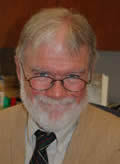
In late summer, the bicycle commute between home and work is nothing less than an honor, requiring, as it does, a passage through the groves of oak and sycamore on the north bank of Saint Joseph’s Lake. Invisible choirs of cicadas thrum from their bark and branches, enveloping those woods in an ancient sound, a sound contiguous with a time before there was sound, before human or even mammalian ears were available or allowed or privileged to hear it.
It is a sound at once solemn and jubilant, something like cheers greeting the return of a beloved and exiled king.
They strike their note early on hot mornings, first supporting and then resuming what the katydids and crickets have been doing throughout the hours of darkness, this ineffable music that takes up all other sounds and even makes the morning’s silence surround itself. The pulse and surge of the cicadas’ whir often invites a bicyclist to hum along in furtive accompaniment, much as some tone-deaf monk might add his own voice to that of his chanting brothers, hoping its inadequacy might be subsumed in the chorus, his sinfulness might be subsumed in their sanctity.
The cicadas’ song transcends the summer, too. A reverberating childhood memory from a time before words, this primordial chant can become, literally, deafening — so loud that it is no longer heard, so present that it is no longer noticed, as vital as one’s own pulse and as easily taken for granted. It is in this sense emblematic of creation.
Cicadas were singing in the days before there were humans to hear them, the days before God became incarnate, the days before God could hear them through the ears of a man. And because God now hears them through our ears, their song has become infinitely significant. True, that agreeable monophonic drone is a mating call and a courtship ritual, a sign of the dog days and a welcome distraction from the heat of the day. But it must now and forever be much more than that.
It now commands close and even reverent attention, because by becoming incarnate, God has heard the song of the cicada through our ears.
Michael Garvey is Notre Dame’s assistant director of public information and communication. Email him at garvey.2@nd.edu.